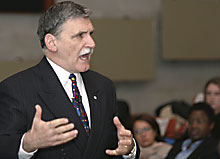Roméo Dallaire speaks out for basic humanity
UN peacekeepers' commander calls for proactive leadership

Roméo Dallaire spoke of proactive leadership and the price of humanity in modern conflict. “Are some people more human than others?” he asked.
Photo by Andrew Dobrowolskyj
When Western forces get involved in moden conflicts, are some people considered more human than others?
Lieutenant-General Roméo Dallaire (Retired), Force Commander of the UN peacekeeping mission during the 1993-94 Rwandan genocide, said in a lecture at Concordia on Oct. 1 that this may be true.
He said that a low tolerance for casualties can scuttle any chance of a successful mission, and may sacrifice the lives of civilians whom the peacekeepers are supposed to be protecting.
“In Rwanda, it was decided that we can handle one dead [Canadian] soldier for every 180,000 dead Rwandans,” he said. “Are some people more human than others?”
The force under Dallaire’s command was cut from 3,000 to 500 after some Belgian soldiers were killed, despite his pleas to the United Nations for an additional 2,000 troops to help stop the slaughter in Rwanda.
“Our priority seems to be to preserve the lives of our soldiers, which appears to be more important than accomplishing the mission. The Belgians went into Rwanda for a week, lost 10 soldiers, and left. And 800,000 Rwandans died. The big discussion [in Belgium] was about the 10 who died, not the 800,000.”
Dallaire said the recent history of peacekeeping missions is rife with ill-defined goals and unprepared troops, who are being thrust into complex, morally ambiguous quagmires.
“Suddenly we have terrible conflicts with no easy solutions. This is a new era of conflict, an era of immense complexity. There are no more good guys and bad guys, white hats and black hats. There are no clear rules according to the Geneva Convention. In fact, people want us to play by no rules.”
Playing by no rules means “being more ruthless than the other guy. That may be successful, but it’s got nothing to do with humanity.”
Another disturbing aspect of this new era of conflict is an increasing reliance on child soldiers.
“We have entered the era of the child soldier. It’s become a rite of passage for nine-year-olds to be able to strip, load and shoot an AK-47 assault rifle. Some child soldiers have been bought, but most have been kidnapped and become dependent on armies. As a result, our soldiers are being put into a situation in which they have to kill children.”
Peacekeepers who return to Canada are often haunted by such memories.
“A soldier in this new era may get an order to shoot, and in a fraction of a second, he fires his machine gun and sees a child’s head explode. Back home, he will see that when he is out shopping, when he is trying to sleep. He will see it every day.
“Today, we have more casualties back home than on the battlefield, because of suicides. We are creating casualties amongst ourselves because our people are crashing.”
Dallaire contends that if Canada and other countries are going to embark on humanitarian and peacekeeping missions, they must be willing to take risks, and military leaders must communicate that willingness with the troops. After his forces were cut, Dallaire led a volunteer force in Rwanda, and was advised on a number of occasions to leave the country for his own safety. He chose to stay, as did his troops.
“In my mission, the troops were sent out on patrols every day. In the first patrols sent out, there were casualties and injuries. I saw the losses, and I knew some of the soldiers were questioning whether or not this was essential.
So I started to give all my orders personally, so they could see my eyes, body language, and commitment to the importance of this mission. In so doing, I was able to convince them that they had to go back, and risk their lives. Otherwise, they wouldn’t have gone.”
Dallaire called for military leadership that anticipates the complexities and prepares peacekeeping troops for the chaotic, unpredictable violence they will face in today’s civil wars and tribal conflicts. Communication is the key.
“Because of the complexity of the legal, moral and ethical dilemmas we face in modern conflicts, the leadership isn’t leading, it’s reacting. The leadership has to communicate with its people, and be proactive. Leadership involves getting ahead of the game.”
“It is a time to get back to the human being: the reference point, the great equalizer. Let people feel you, be part of you, and together you can achieve your mission beyond what, individually, you think is even possible.”
Dallaire is the author of the new book, Shake Hands with the Devil: The Failure of Humanity in Rwanda. His lecture was presented by Abitibi-Consolidated.